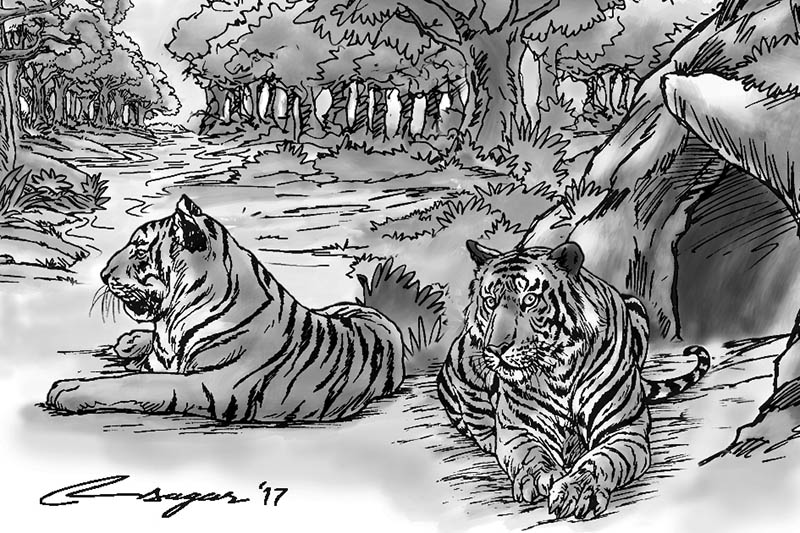Thucydides trap: Blame or claim
China’s OBOR project is to expand her own economy and enhance the entire Asian region and to initiate mitigating regional problems. America and other Western nations should not myopically foresee problems in China’s progress
Economic growth is a single agenda that spaces from centre to circumference as the first and last expectation of each nation. Even success or failure of a nation too is gauged on economic progress.
Issues like unemployment reeducation, economic growth and trade expansion become invariably universal issues for all.
Lately, a business project with exactly the same interest, called One Belt One Road, initiated by President of China, Xi Jinping, has capaciously come into the world’s limelight. Especially Western nations are suspicious as to whether China’s initiation will drive the world into a Thucydides trap, therefore, to offer stringent censure and antipathy at this mission.
When the status of power alters, the rising power’s growth and advancement may defy and challenge the ruling power. Such a trap is called a Thucydides trap.
Allison Graham, a Havard scholar and an expert in American special security committee, penned a book titled ‘Destined for War: can America and China Escape Thucydides Trap’ and brought the word to be viral in discussion. 2400 years back, writer Thucydides authored a book ‘The History of Peloponnesian War’ to document the war between Sparta, the ruling state, and Athens, the rapidly rising state of that time.
Thucydides claimed that the Athens’s rise countered then posed a challenge to Sparta, and thus the war was tailored and then the entire Peloponnesian belt suffered. Graham has baptized it a Thucydides trap. Among 16 such scenes of the past, where rising power countered ruling power, 12 of them resulted in violent war.
Habsburg’s counter on France in the 16th century, France’s overriding over Britain in the 17th century, Germany’s pressure over France in the 19th century and Germany’s trap over Russia and Britain respectively in the 20th century are a few examples of such Thucydides traps.
China’s recent but aggressive initiative, the OBOR, is construed as an effort of such a trap to the Western world. Thus the West is scared about OBOR.
Asia is undoubtedly the leading world market now. This continent holds 30% of the land and 65% of the population in 50 nations all together. Now most Asian countries have exceptionally exponential economic growth. Most of the tiger economies are in Asia. Europe is slackening since long.
America has already been left behind China both in purchasing power and parity index. Thus China’s growth infallibly poses pools of challenges to America. Nonetheless the Westerners should not be apprehensive.
Following Russia disintegration in 1990, Francis Fukuyama documented a famous book ‘The End of History and Last Men’ to claim that the conflict had come and the generation was last to be the bystander of fracas among nations. He inferred so because the socialist block had collapsed and thus the perennial hegemony of capitalist, America, would persist, he postulated.
Michael Auslin’s book The End of Asian Century builds a similar synopsis. These books were read over the globe; therefore it led people to assume that only capitalism is the sole and single power in the world.
As a big U-turn, China is making radical and rapid growth and thus has commanded influence over Asia and the globe too. OBOR is to serve the very purpose. Tom Miller’s book ‘China’s Asia Dream’ and Bernard Cole’s ‘China’s Quest for Great Power’ argue the same.
Following Deng Xiaoping’s modified socialism policy China is taking a swift, sound, and unparalleled economic growth. Such exceptionally exponential growth of China’s economy definitely places America back.
Thus, America is doing its best to avert China’s speed of development and if not tries to defame it by building anti-Chinese mindset globally. China’s exercise of veto in UN Security Council has further threatened America. Ensuing supply of goods to North Korea has made the Westerners panicky. Founding some powerful regional institutions like BRICS and AIIB has fueled the wrath at the fullest.
Being world powers both China and America strive to balloon power and influence over the world, but it is an undeniable fact that they refrain from engaging in war with any excuse.
The world has changed into a global village with considerable numbers of conscious citizenry, thus it hails and heralds global pressure to avert activities prone to produce war. Even an accord of working together for world peace and prosperity has been made.
China has equal concern and contributes to global peace and security and thus makes no excuse to invite war. Rather the project is to expand her own economy and enhance the entire Asian region and to initiate mitigating regional problems as well as to enhance regional fraternity.
Thus, China’s progress may not plunge into war and doubts for America are unjustifiable. America and other Western nations should not myopically foresee problems in China’s progress. Envisioning the loss of control over the world, objection on China’s initiative is not a fair trial.
If China counters America then she has to either bear or should re-counter it with sound plans ahead.
But bewailing and bemoaning it as a base for war and simply being bewildered by the speedy progress of China can’t be proved to be anything more than simply a prejudiced blame.
Dahal is an Associate Professor at Kathmandu School of Law






